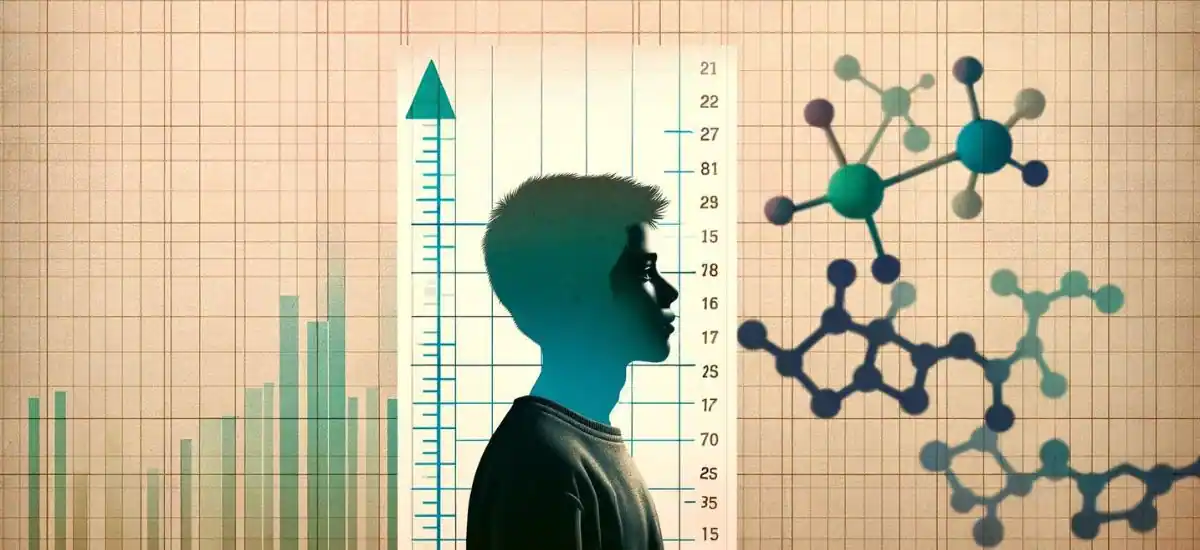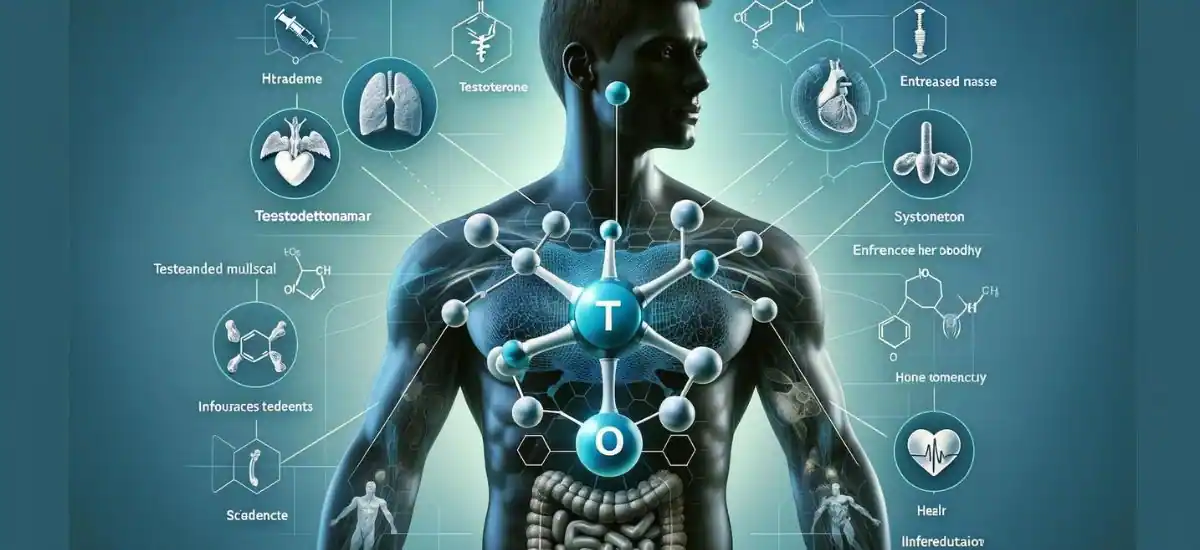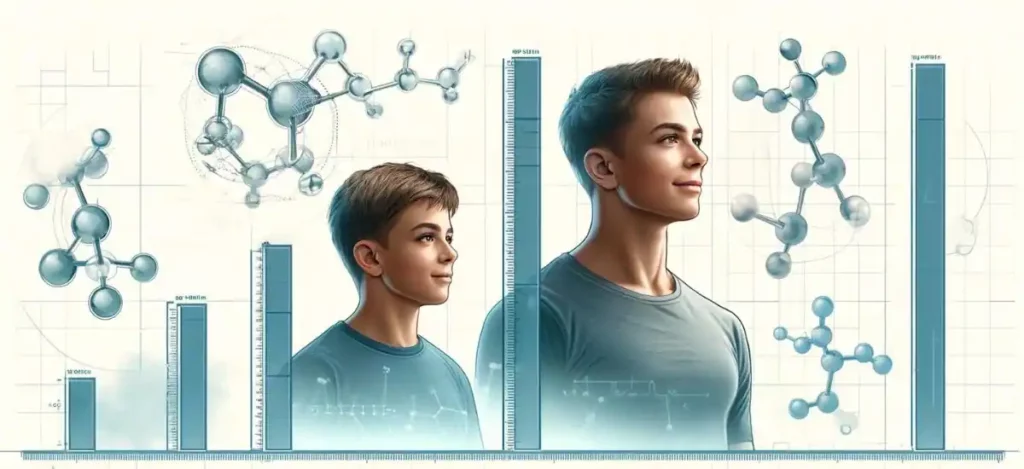Testosterone, a pivotal hormone in growth and development, plays a significant role during puberty, particularly influencing height. Yes, testosterone can indeed make you taller, but this effect is confined to a specific period of growth. Testosterone contributes to the rapid growth spurts experienced in adolescence, primarily by stimulating the growth plates at the ends of long bones.
However, once these growth plates have fused, which occurs after puberty, testosterone’s ability to affect height ceases. This means that while testosterone can indeed foster notable height increases during critical growth periods, its impact is limited to the pre-adult years. For parents monitoring their child’s growth, understanding this can help manage expectations about growth potential and the timing of developmental milestones.
The Role of Testosterone in the Human Body

Chemical Structure and Production
Testosterone is a steroid hormone with a core structure consisting of four fused carbon rings. It is primarily synthesized in the testes in males, the ovaries in females, and small amounts are produced in the adrenal glands in both sexes. Its production is regulated by the hypothalamic-pituitary-gonadal axis, where the hypothalamus releases GnRH (gonadotropin-releasing hormone) to stimulate the pituitary gland to produce LH (luteinizing hormone) and FSH (follicle-stimulating hormone), which in turn stimulate testosterone production.
Primary Functions of Testosterone
In Males:
- Development of Male Genitals: Testosterone is pivotal during fetal development, primarily responsible for the formation of male reproductive organs.
- Voice Changes: During puberty, testosterone leads to the deepening of the voice, a hallmark of male developmental changes.
- Facial and Body Hair: It drives the growth of facial and body hair, marking another key adolescent transformation.
- Muscle Mass: Testosterone significantly contributes to muscle growth and increased body mass during and after puberty.
- Bone Density: It helps in maintaining and increasing bone density, crucial for overall skeletal strength and health.
In Females:
- Ovary Function: Although present in much lower amounts, testosterone supports healthy ovarian function and plays a role in female fertility.
- Bone Strength: Testosterone contributes to bone strength, helping prevent osteoporosis and bone density loss.
- Sexual Desire: It influences libido, playing a subtle but important role in sexual arousal and health.
These functions highlight how testosterone is essential not just for sexual characteristics and reproduction but also for overall physical health and development in both males and females. Understanding these roles can help appreciate the broad impact of this hormone on human health and development.
- Expert Insights- Dr. Jane Smith, Pediatric Endocrinologist: “Testosterone plays a crucial role during puberty, primarily stimulating the growth plates in long bones. However, its effects are highly dependent on the timing of puberty and individual hormonal levels.”
Influence on Physical Development During Puberty
During puberty, testosterone levels surge, leading to various physical changes. For boys, this is typically the period of most rapid growth in height, known as the growth spurt. Testosterone works in tandem with growth hormone to significantly influence bone mass and strength, muscle growth, and the overall body composition changes seen in teenagers.
Growth and Development

Understanding how humans grow and the influences on that growth is crucial for both medical professionals and parents. Growth is a dynamic process, influenced by a combination of genetic, hormonal, and environmental factors.
Human Growth Patterns
Human growth is not uniform throughout life but occurs in distinct phases, each characterized by different rates and triggers:
- Infancy: Growth is rapid and primarily influenced by nutritional intake and genetic factors.
- Childhood: Steady growth continues, moderated by health and nutrition. This phase sets the stage for the significant changes that occur during puberty.
- Puberty: A critical growth phase when most individuals experience their peak growth spurts. Hormones, particularly growth hormone and sex steroids like testosterone and estrogen, play pivotal roles.
- Adulthood: Growth in height typically ceases as the epiphyseal plates (growth plates) in the bones fuse, although muscle and fat distribution continue to change influenced by hormones.
Role of Growth Hormones
Growth hormone (GH), produced by the pituitary gland, has a primary role in promoting height and muscle development. It stimulates the liver and other tissues to produce IGF-1 (insulin-like growth factor 1), which directly stimulates the growth of bone and other body tissues.
This process is crucial in understanding what is the average height of an 18 year old, as GH levels significantly influence height outcomes during the peak growth years leading up to adulthood.”
Interaction with Testosterone
During puberty, the increase in testosterone levels enhances GH secretion and function. Testosterone amplifies the effects of growth hormone, not only increasing the growth rate of bones but also influencing their density and strength. This synergistic effect is crucial during the adolescent growth spurt.
Testosterone and Its Direct Effects on Growth
Testosterone’s influence on growth, particularly during puberty, is profound and complex. Understanding this relationship requires a focus on the physiological mechanisms at play.
Impact on Growth Plates
The growth plates, or epiphyseal plates, are areas of growing tissues at the ends of the long bones. These plates are responsible for lengthening the bones, thus contributing to height. Testosterone, along with estrogen (which is converted from testosterone in the body), plays a significant role in the maturation and eventual closure of these growth plates.
- Testosterone’s Role: It stimulates the proliferation of cartilage in the growth plates, which is later replaced by bone, contributing to bone elongation.
- Estrogen’s Role: Surprisingly, estrogen, converted from testosterone in males and produced in the ovaries in females, is critical in the eventual closure of the growth plates. High levels of estrogen signal the end of the growth period, leading to the fusion of the plates, which stops further lengthening of the bones.
Sidebar: Dr. Aaron Lee Explains Growth Plates
- “Growth plates are the key areas in bones where growth occurs during childhood and adolescence. Testosterone and estrogen have significant roles in either stimulating or closing these plates, which impacts overall height.”
Parental Perspective on Growth Monitoring
For parents, understanding the role of hormones like testosterone in their child’s growth can be particularly important. Pediatricians might evaluate hormone levels if a child shows signs of delayed puberty or unusually slow growth patterns. Parents are often involved in discussions about potential interventions, including hormone therapies, to address these concerns.
Studies and Research Findings
Numerous studies have explored the relationship between testosterone levels and height, particularly focusing on individuals with hormonal imbalances or undergoing hormone therapy.
- Key Studies Overview: Research often targets populations with specific medical conditions affecting hormone levels, such as hypogonadism or growth hormone deficiencies.
- Clinical Trials and Observational Studies: These studies provide insights into how supplemental testosterone or treating testosterone deficiencies can affect height. Generally, results indicate that testosterone can significantly impact growth during critical growth periods but has little to no effect once the growth plates have closed.
- Conflicting Results and Inconsistencies: While many studies support the role of testosterone in promoting height, discrepancies arise due to genetic differences, the timing of hormone administration, and other environmental factors that also impact growth.
Factors That Influence the Relationship Between Testosterone and Height

While testosterone plays a crucial role in growth, it does not act in isolation. The interplay of multiple factors can influence how significantly testosterone affects height.
Genetic Factors
Genetics is the primary determinant of height, dictating the potential for growth and how the body responds to hormones like testosterone. Genetic variations affect:
- Hormone Levels: Some individuals naturally produce more testosterone due to genetic predisposition.
- Receptor Sensitivity: Variations in androgen receptor sensitivity can affect how effectively testosterone acts on target tissues, including growth plates.
Environmental and Nutritional Factors
The environment and nutrition also play significant roles in determining height and the effectiveness of testosterone:
- Nutrition: Adequate nutrition during childhood and puberty is critical for growth. Deficiencies in essential nutrients like protein, calcium, and vitamins can impair hormone production and action.
- Lifestyle: Physical activity levels and overall health can influence hormone levels. Regular exercise, for instance, has been shown to positively impact testosterone levels.
Health Conditions
Certain medical conditions can affect testosterone production and action, thereby influencing growth:
- Endocrine Disorders: Conditions like hypogonadism (low testosterone production) can significantly delay puberty and stunt growth if not treated.
- Chronic Diseases: Illnesses such as diabetes or autoimmune diseases can interfere with hormone production and overall growth patterns.
Clinical Implications
Understanding the relationship between testosterone and height has significant clinical implications, particularly in diagnosing and treating conditions that affect growth.
Conditions Involving Abnormal Testosterone Levels
Conditions like hypogonadism or hypergonadism (high testosterone production) can lead to abnormal growth patterns:
- Hypogonadism: Often treated with testosterone replacement therapy to help initiate and sustain normal pubertal development and growth.
- Hypergonadism: May require interventions to balance excessive hormone levels, which can also impact growth and development.
Testosterone Therapy and Growth Issues
Testosterone therapy is used to treat various conditions, but its use in children and adolescents must be carefully considered due to potential side effects and long-term implications:
- Efficacy: Testosterone can effectively induce growth spurts in individuals with delayed puberty but has limited impact once growth plates have fused.
- Side Effects: Potential side effects include premature fusion of growth plates, which can ultimately reduce adult height, and other long-term hormonal imbalances.
Parental Perspective on Hormone Therapy
Parents facing decisions about hormone therapy for their children often weigh the benefits against potential risks. The decision involves considerations of:
- Long-term Impact: What are the long-term health implications of early hormone intervention?
- Psychological Effect: The psychological impact of altered development timing on children and teenagers.
- Medical Supervision: The importance of careful monitoring by healthcare providers to minimize risks and maximize benefits.
Understanding these factors is particularly relevant when considering the average height for a 17-year-old male and female, as hormone therapy can influence growth outcomes during this critical developmental stage.”
Frequently Asked Questions
- FAQ: Can testosterone therapy be used to treat height issues in children without diagnosed hormone deficiencies?
- Testosterone therapy is generally not recommended for children who do not have hormone deficiencies, as the risks, including premature growth plate fusion and other side effects, generally outweigh the potential benefits.
- FAQ: Are there any natural ways to boost testosterone levels to potentially increase height during puberty?
- While genetic factors largely determine testosterone levels, maintaining a healthy diet, getting regular exercise, and ensuring sufficient sleep can help optimize natural hormone production during growth periods.
- FAQ: Can testosterone levels affect height growth in girls during puberty the same way it does in boys?
- Testosterone does play a role in girls’ physical development during puberty, but its impact on height is less significant than in boys. Estrogen is the more critical hormone influencing growth patterns in females.
- FAQ: What are the indicators that suggest a need for testing testosterone levels in adolescents?
- Indicators might include delayed puberty, such as a lack of development of secondary sexual characteristics by an age where peers are progressing, unusually slow growth rates, or symptoms of hormonal imbalances like excessive fatigue or mood changes.
